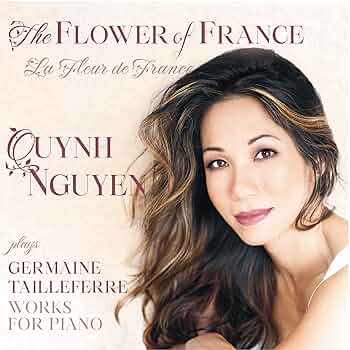Review: Quynh Nguyen plays the piano works of Germaine Tailleferre

“It’s about time.” That’s a phrase that’s rightly heard more and more these days regarding the heightened interest, awareness, and research into women composers. The CD release The Flower of France: Music of Germaine Tailleferre (Music & Arts MA CD-1306, released July 7, 2023) is a perfect example of that.
Who is Germaine Tailleferre (pronounced "Zhur-main Tie-yeh-fair")? Born April 12, 1892, in France she was a composer, pianist, and teacher who studied at the Paris Conservatoire, where she met fellow composers Francis Poulenc, Darius Milhaud, Arthur Honegger, and others. She spent time with Maurice Ravel in the early 1920s and became the only female member of the group of early 20th-century French composers know as Les Six.
The bulk of her successful works were written in the 1920s and 1930s. She fled France during World War II and returned thereafter to continue writing music including scores for film and television. Most of those works were not published in her lifetime. She passed away November 7, 1983.
Dr. Quynh Nguyen (pronounced "Qwin Nwen") is an award-winning Vietnamese American pianist who is a graduate of The Juilliard School, Mannes College of Music, and the Graduate Center of CUNY. After her Carnegie Hall debut, critic Harris Goldsmith wrote that she is “a real artist, a wonderfully communicative performer.” She is currently on the music faculty of the Music Department of Hunter College, City University of New York.
The recording The Flower of France: Music of Germaine Tailleferre has 40 tracks that cover the long and far-ranging career of Ms. Tailleferre, from her first published work, the lyrical Impromptu of 1912 (she was 12 years old then), to Singeries ("Monkey Business") written in 1975. The recording gets its title from the solo piano suite Fleurs De France (1930) where each piece of the suite was prompted by a flower that evokes the landscapes of distinct regions of France.
From the liner notes by Ms. Nguyen “…I came across Tailleferre’s Ballade for Piano and Orchestra (1920) in 2019, I found it to be exceptionally beautiful. Listening to more of her music , I fell in love with the romanticism, colors, and harmonic inventiveness of her work. Her early works remind me of Chopin and were heavily influenced by Debussy and Ravel, with a freshness of melodies and unexpected modulations that’s incredibly alluring.”
The recording contains works originally for solo piano as well as transcriptions and excerpts from ballet and film scores and are presented in chronological order. The shortest of these runs 38 seconds(!)—"La Dispute" from the 1952 work L’Aigle des rues: Suite of Five Pieces—to 3 minutes 58 seconds with Pastorale Inca of 1931. If I was asked to judge her work based upon the 40 tracks presented here, I’d say that she is the consummate miniaturist.
Further research indicates that she was not just a miniaturist. She wrote two concertos for solo piano and orchestra (1923, 1951); one concerto for two pianos, chorus, saxophones, and orchestra (1934); and a violin concerto (1937). Currently discogs.com lists (surprise!) 64 albums (recordings) of her music, starting with the 1954 release Le Groupe des Six on Angel Records (2-LP set in Mono), released on Columbia (also a 2-LP Mono set) in 1955 in the UK, to this 2023 release.
We received the disc at WILL in early July. I played Pastorale in A flat Major (1928), Impromptu (1912), and Sicilienne (1928) on the Saturday, July 15 “Classics By Request” program. You can listen to the entirety of The Flower of France through the Spotify player below. I highly recommend the disc and performances.



